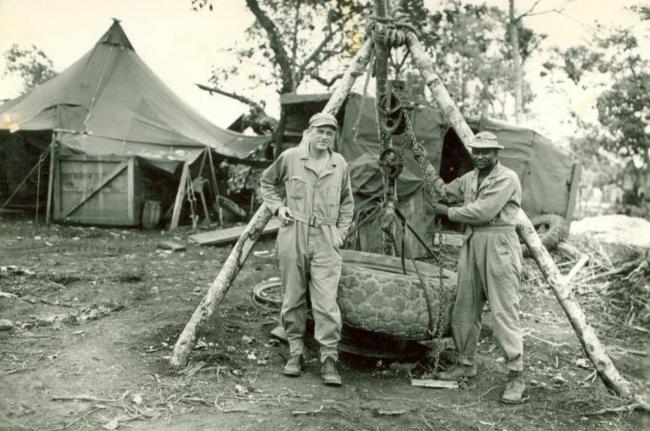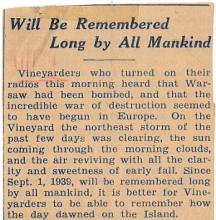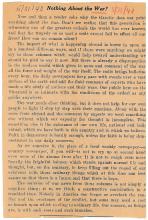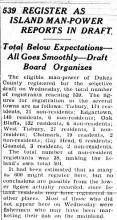"The tumult and the shouting dies,
The captains and the kings depart. Still stands our ancient sacrifice,
An humble and a contrite heart."
When Kipling wrote his famed Recessional he could not have possessed the gift of prophecy, yet his opening verse might well have been applied to the Vineyard, and other like communities, on Tuesday. In a questioning, almost bewildered silence, in which only a deep spirit of thankfulness was apparent, Martha's Vineyard received the official news that Germany had surrendered and that the hostilities in Europe were at an end.
But there was no celebration. There were church services, attended by members of various faiths, all drawn by the same bond which has united natives of various countries and sects in one common opinion and cause. Many stores and other business places were closed, but others remained open and many people remained at their work. School children were dismissed for the afternoon.
When the Dawn Came
There was nothing sudden about the announcement. There was no abrupt change in anything that was apparent. Rather the process by which the news arrived was slow, with all the deliberation of a sunrise breaking, yet when the dawn came it shone upon a scene of Sabbath calm.
Yet it would not be correct to say that the news, welcome as it was, brought a full measure of relief either from anxiety or apprehension. It was this, perhaps, that stifled all thoughts or suggestions of a celebration of any kind. For, as the people moved about the village streets on Tuesday morning, their faces were grave, even as they spoke words of thanksgiving to one another.
They were thinking of the many sons of the Island who are still in what was but a few days ago a war zone, whose only address for years has been in care of the post offices of New York and other points of embarkation. They were thinking of some of them, last reported as prisoners of the enemy and, who have not yet been located by the rescuers. While they paused to talk, the Navy planes roared overhead in unending flight, while fighters trained for the Pacific combat that looms ahead. Everyone was glad, everyone was thankful, but everyone realized that the cessation of hostilities in Europe does not mean the end of war.
Moreover, the urge to put forth their utmost efforts in whatever line of endeavor they might be engaged cannot be dropped or ignored in an instant. In the midst of their rejoicing that one war is won, people spoke of the task that lies ahead, both at the front and at home, and assured each other gravely that a tough period yet remains.
They could not shake off the influence of years of restrictions, demands, and preparations for dangers that never developed, but which were always a threat. Nothing, a mere nothing, as compared with the hazard and sacrifice of the men in action, and yet, by the same token, exerting its influence upon the lives of the home folks, even as it has upon those of the fighting men. And it was to these things, all these things, that Vineyarders referred in their conversation on V-E Day.
No Ordinary Conflict
Observing these people, who are typical of those of all America, and listening to their words, the thought came home as never before, that this has been no ordinary conflict. As wars go, the argument has been advanced that this has been the worst, the greatest, the most violent threat to the world. But this is true above all, that never in the history of America, and perhaps never in the world, has a nation girded itself for war and sent its men forth to battle in such grim silence and utter absence of fanfare and militant display.
Now, the war is ended in one area, and the hesitancy of the home folks, as revealed in Vineyard people on Tuesday, may well be a reflection of the nation's thoughts and reactions. Their every word of conversation spoke of their thankfulness, but in the same moment of their unspoken questions. "When are the men returning? How many will return? Or will they go to the Pacific area first?"
And more, far more important than the question so frequently heard and read, "How will they be changed?", is the query, "How will they find home changed?" and "How will thy like it?" For even the little Island of Martha's Vineyard has experienced a change through the war influence, a change apparent to those earnest people who met and talked so quietly on Tuesday. Should they, then, celebrate? They looked the question, they voiced it, and always the answer remained the same, “Not yet, not yet.”










Comments